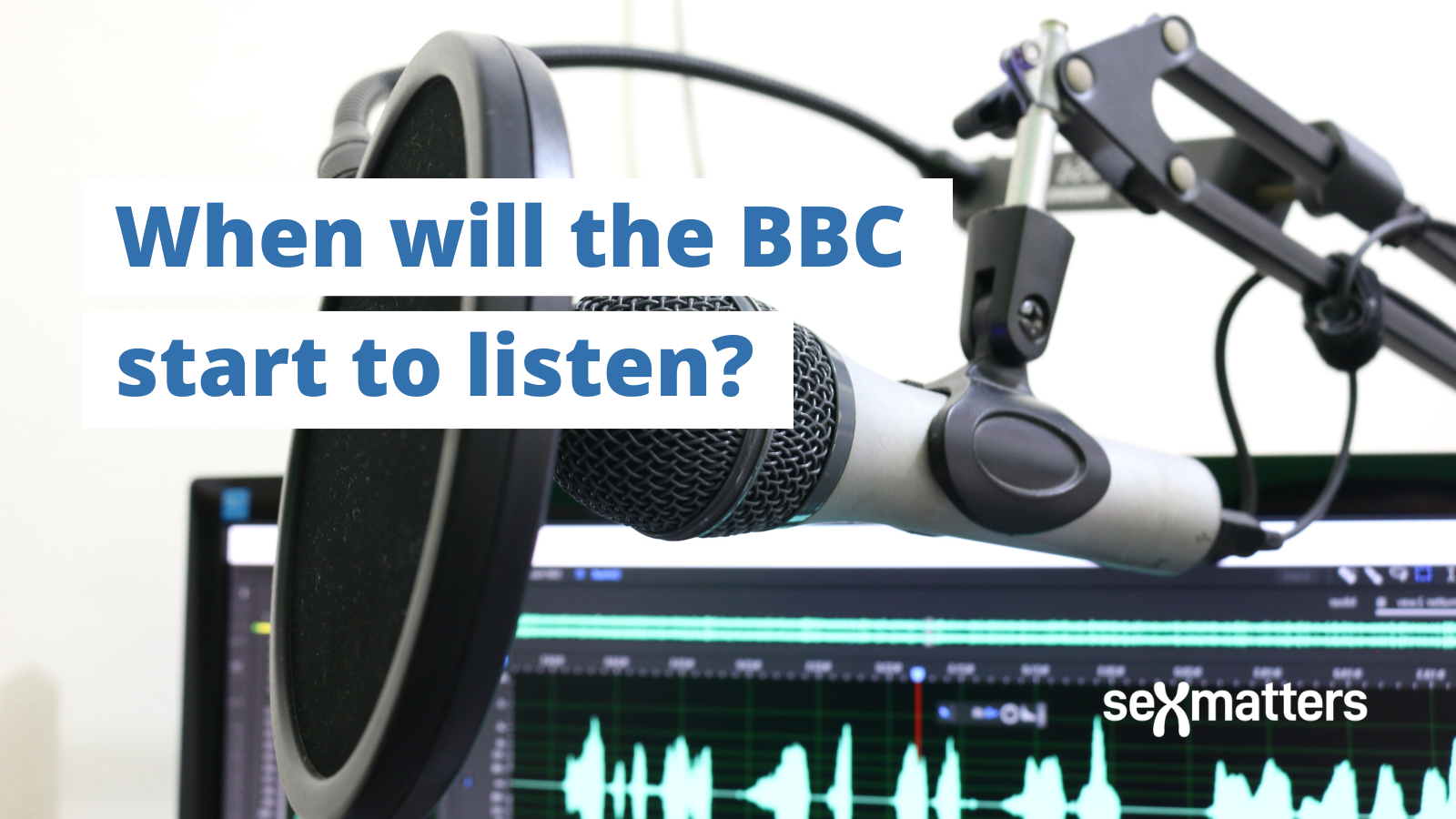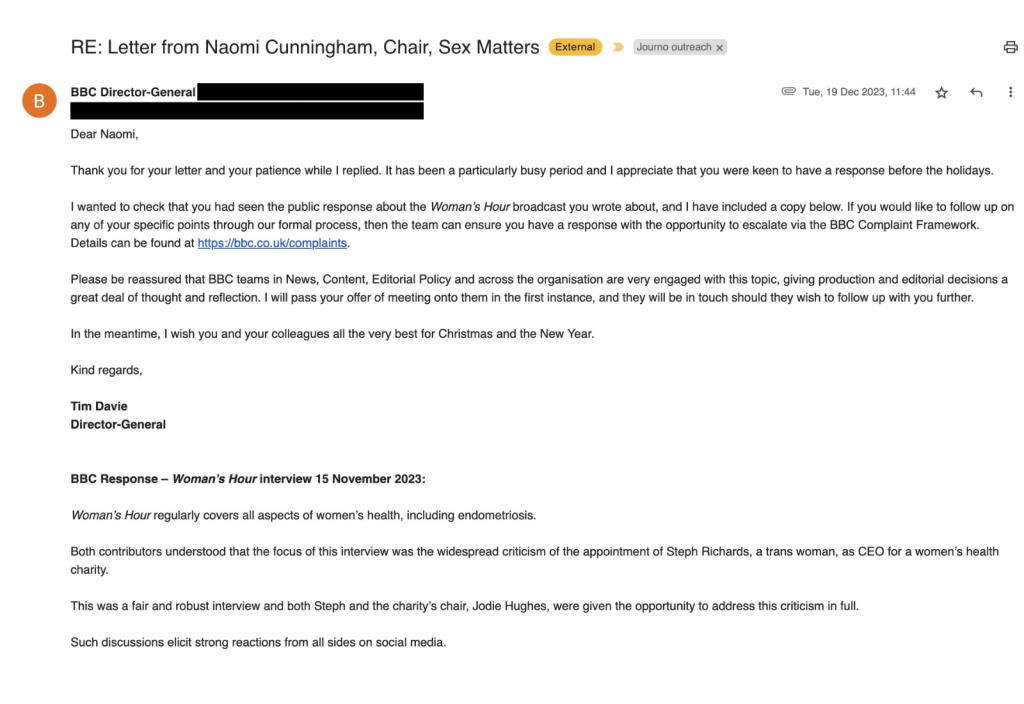Why does the BBC keep getting sex and gender wrong?

In November 2023, BBC Woman’s Hour interviewed Steph Richards – a man who has publicly documented his harassment of women in the name of trans-rights activism – because he had been appointed as CEO of a micro-charity, Endometriosis South Coast.
This is part of a pattern where the BBC gets things wrong on the topic of sex and gender and does not cover gender-critical voices or stories. The week before, Woman’s Hour allowed misleading remarks by athlete Caster Semenya to pass unchallenged. During the interview, Semenya self-described as “female” and as having a medical condition that causes “abnormally high testosterone”, when it is a matter of scientific fact that Semenya has a disorder of sex development that affects only males, and has normal testosterone levels for a male.
On the morning of Richards’ interview on 15th November, 15 organisations that campaign for sex-based rights, including Sex Matters, wrote to BBC director-general Tim Davie and a group of senior BBC executives to urge them to reconsider platforming Richards on the BBC’s flagship programme for women, given his repeated harassment of women.
We warned them that Richards had coordinated a protest against FiLiA – Europe’s largest feminist conference – in Portsmouth in 2021, where placards read “Suck my d**k you transphobic c**ts” and a session discussing the mass rape experienced by women and girls during the genocide in Tigray, Ethopia was drowned out by protesters shouting “Transwomen are women!” and “Blow jobs are real jobs!”. Protesters at the event also disrupted a candlelight vigil commemorating the lives of women and girls killed by men.
We told Davie and senior executives that Richards believes that “men”, “women” and “children” are social constructs, that he told a survivor of child sexual assault to “grow up” and said “no one groomed you”, and that he has written a series of inflammatory and offensive blogs about women who campaign for women’s rights.
The BBC acknowledged receipt of our intervention but the interview went ahead, and Richards was joined by his colleague Jodie Hughes. Presenter Emma Barnett was robust in handling the interview, but, as we predicted, Richards’ public and self-documented history of insulting, demeaning and threatening women was barely touched upon. The only mention of this behaviour was that he has called campaigners for sex-based rights “TERFs” (trans-exclusionary radical feminists).
On 29th November, Sex Matters chair Naomi Cunningham wrote to Tim Davie to posit that Richards’ interview illustrated a wider pattern of misinformation, obfuscation and misjudgement in the treatment of sex and gender by the BBC. She proposed a process of strategic engagement for Davie and fellow executives with experts and campaigners who could provide mainstream and legally sound perspectives on sex and gender.
Naomi suggested that if a man who did not identify as a woman and had exhibited similar behaviour to Richards had appeared on Woman’s Hour, his pattern of harassment and intimidation towards women would likely have been a key focus of the interview.
She also pointed out that although Emma’s questions were well-informed, the platforming of ideologues predictably led to misinformation being aired on a flagship BBC programme – in this case that endometriosis isn’t a sex-based condition. It is a sex-based condition that affects millions of women. Only around 20 cases have ever been recorded of men experiencing similar symptoms, but they were not because of endometriosis.
Naomi also wrote that sexologists have known for over a century that men who identify as women often do so for erotic reasons. She explained that among these men’s motivations is the desire to seek validation as women, and that they gain this validation when accepted and presented as “women” – especially when women who demur are overruled, sidelined or silenced. Naomi highlighted that the implications of this for the safeguarding and wellbeing of women and children are poorly understood within the media.
Following years of investment in and engagement with transactivist organisations, the BBC’s corporate position appears to be that people are men or women, male or female, according to what they say they are, not their immutable biology. She pointed out that:
- this is contrary to UK law: the Gender Recognition Act cannot change people’s sex in material reality, and does not impose any obligations on private individuals or on journalistic coverage to pretend that it can)
- this is contrary to material reality: humans are mammals, and mammals can’t change sex
- this contrary to human rights – gender ideology is harmful to the rights of women (sexism is based on women’s sex, not our avowed “gender identities”), gay people (if sex isn’t real, then neither is sexual orientation) and children (thousands of whom are being subjected to harmful experimental medical treatments).
Naomi wrote that the dominant culture at the BBC appears to define acknowledging the reality and immutability of binary sex as bigotry, both within the workforce and when engaging with external parties, and that this is entirely incompatible with the BBC’s status as the national, taxpayer-funded broadcaster, with a statutory duty to be impartial.
She also said that the BBC’s position is a fringe one held by only a small minority of Britons: polling consistently shows broad rejection of the assertion that “transwomen are women” and of the claim that men who identify as women should have a right of access to female-only spaces, services or sports.
The embedding of a problematic ideological approach to sex and gender has affected the BBC’s output across the organisation, including news and current affairs, sport, entertainment and children’s programming.
She proposed that Tim and fellow BBC executives initially meet with five women who could speak to different aspects of sex and gender as part of a strategic engagement process. She suggested the involvement of Nicola Williams and Fiona McAnena of Fair Play For Women, who are experts on physiological differences between the sexes, especially male sporting advantage; Joan Smith, author of Misogynies and former adviser to London Mayor Sadiq Khan on violence against women and girls, who could speak to the way obfuscation about the two sexes harms the fight to end male violence against women; and Maya Forstater and Helen Joyce of Sex Matters, who could explain the legal position on sex and gender identity, and more generally the need for clarity on sex in law and everyday life. Naomi also offered to meet with Tim herself.
Tim replied to Naomi on 19th December. He shared the BBC’s public response to Richards’ Woman’s Hour interview and directed her to the BBC Complaints form if she wished to follow up on any specific points relating to the interview.

He also said: “Please be reassured that BBC teams in News, Content, Editorial Policy and across the organisation are very engaged with this topic, giving production and editorial decisions a great deal of thought and reflection. I will pass your offer of meeting onto them in the first instance, and they will be in touch should they wish to follow up with you further.”
As of March 2024, Sex Matters has not heard from anyone at the BBC regarding our offer to meet or the proposal for a broader process of strategic engagement.
